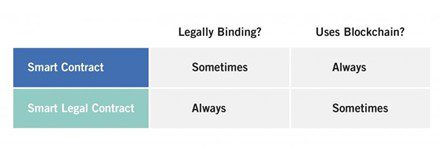If interested in learning about smart contracts, not from a technologist, but from a lawyer that understands technology, this article in The National Law Review is for you!
It opens with simple examples of what a smart contract is and what it does (I enjoyed the vending machine example). Things get more interesting as smart contracts are evaluated based on existing Uniform Commercial Codes. This is where the rubber starts to meet the road.
The article also evaluates smart contracts versus smart legal contracts, which is obviously an important distinction, and categorizes common vulnerabilities smart contracts might exhibit. This article is well worth your time if trying to better understand contracts implemented in software (and references are available in the article):
“In addition, for the smart contract to constitute a legally binding contract for the sale of goods, the contract must also satisfy the various requirements of Article 2 of the Uniform Commercial Code (UCC), including its statute of frauds requirements and its requirement that the contract set forth a quantity in order to be enforceable.5 Practitioners will need to evaluate on a case-by-case basis whether a smart contract meets these elements and therefore represents a binding legal contract for the sale of goods.
The Uniform Law Commission and the American Law Institute established a Uniform Commercial Code and Emerging Technologies Committee6 to study and evaluate the UCC in the context of “among other issues, distributed ledger technology, virtual currency, electronic notes and drafts, other digital assets, payments, and bundled transactions,” and the Uniform Law Commission released an issues memorandum7 discussing these topics in July 2021 following two years of committee meetings. While smart contracts have been part of the discussion, no formal evaluation for smart contracts has been performed by the Uniform Law Commission or the American Law Institute, leaving open the opportunity for clearer guardrails in the future as to whether a smart contract amounts to a legal contract.
Smart Contracts vs. Smart Legal Contracts
Smart contracts are not to be confused with smart legal contracts. While a smart contract is a computer program coded to effectuate an outcome upon the occurrence of a triggering event, a smart legal contract is “a legally binding agreement that is digital and able to connect its terms and the performance of its obligations to external sources of data and software systems.”8 The Accord Project makes clear that, although a smart legal contract can use smart contracts via blockchain technology, a smart legal contract can also be created using traditional software systems without the use of blockchain.9”

Overview by Tim Sloane, VP, Payments Innovation at Mercator Advisory Group










